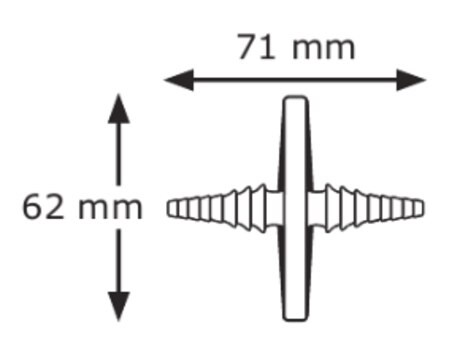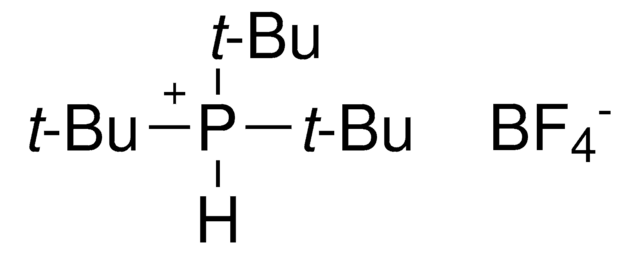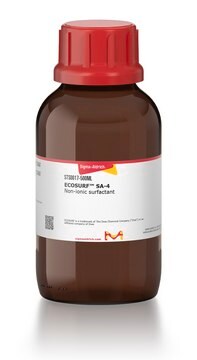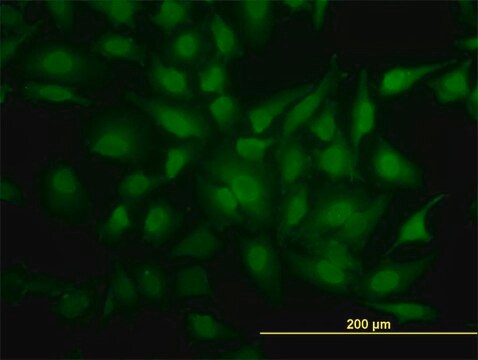CIB002
Cell-in-a-Box® Decapsulation Solution
About This Item
Produtos recomendados
Formulário
liquid
Condições de expedição
ambient
temperatura de armazenamento
room temp
Descrição geral
The Cell-in-a-Box® Decapsulation Solution is a cell-friendly reagent that gently dissolves the membrane of porous bead capsules generated with the CIB001 kit, allowing the user to recover and harvest the encapsulated cells for further downstream analysis and processing, such as cell counting, DNA extraction, and fluorescence imaging.
Aplicação
2. Take 800 ul of Decapsulation Solution (10X) and add it into the well, in order to make a 1X working solution.
3. Place the plate on a horizontal shaker under gentle shaking for 15-30 minutes. Observe regularly with the naked eye or under the microscope to determine when the decapsulation process is sufficiently completed
4. Pipette all the contents into a 15 ml centrifuge tube and centrifuge at 200-300g for 5 minutes.
5. Discard the supernatant and resuspend the cell pellet with 8ml fresh medium or PBS.
6. Repeat step 4.
7. Remove the supernatant and resuspend in an appropriate volume of cell culture medium or PBS for specific downstream application.
Notes:
The Decapsulation Solution has been optimized for the decapsulation of capsules as described in the procedure above. Should there be a need to deviate from it, the procedure will need to be re-optimized at the users own discretion. As a general rule, the ratio of 10 capsules to 8 ml of 1X Decapsulation Solution should be maintained. Increasing the number of capsules used might lead to incomplete decapsulation, while increasing the concentration of Decapsulation Solution might cause some loss of cell viability.
Outras notas
- Capsules did not dissolve or takes a lot longer than expected to dissolve. Decapsulation Solution concentration in the media can be gradually increased to 2X, while the agitation speed can also be raised.
- Decapsulated cell viability is lower than encapsulated. While the Decapsulation Solution has been tested on multiple cell types and found to have no noticeable cytotoxic effects at the given concentration, it is possible that certain cell lines might be particularly more sensitive. In such a scenario, the best action is to reduce exposure time to Decapsulation Solution as much as possible by monitoring the process closely and removing the solution as soon as decapsulation is complete. If necessary, Decapsulation Solution concentration can be increased with discretion to 2X in order to reduce the time required for decapsulation.
- Decapsulated cell clusters do not separate into individual cells. Cells growing within the environment of the capsule often form 3D aggregates that do not dissociate easily. Depending on the downstream application and cell type, the user might wish to consider treatment with cell dissociating treatments such as Trypsin, EDTA and Accutase reagents.
Informações legais
Código de classe de armazenamento
10 - Combustible liquids
Classe de risco de água (WGK)
WGK 2
Ponto de fulgor (°F)
Not applicable
Ponto de fulgor (°C)
Not applicable
Escolha uma das versões mais recentes:
Certificados de análise (COA)
It looks like we've run into a problem, but you can still download Certificates of Analysis from our Documentos section.
Se precisar de ajuda, entre em contato Atendimento ao cliente
Já possui este produto?
Encontre a documentação dos produtos que você adquiriu recentemente na biblioteca de documentos.
Artigos
Cell-in-a-Box® technology allows cell encapsulation using biocompatible semipermeable cellulose nanoparticles for cellular therapy and 3D cell culture applications.
Nossa equipe de cientistas tem experiência em todas as áreas de pesquisa, incluindo Life Sciences, ciência de materiais, síntese química, cromatografia, química analítica e muitas outras.
Entre em contato com a assistência técnica






